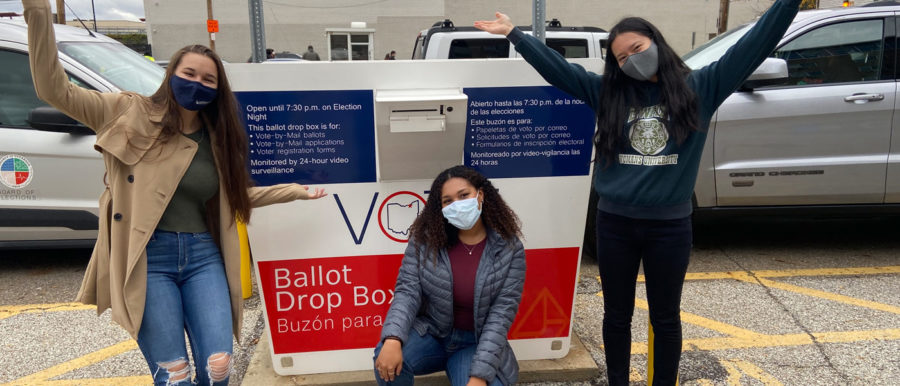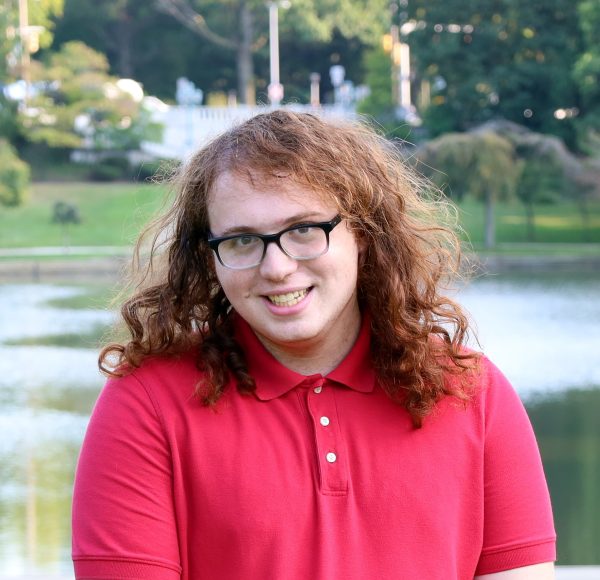Shuttles and pies: A glimpse into Election Day at CWRU
Bringing many CWRU students to the polls last Tuesday, CWRUVotes organized yet another successful Election Day.
November 11, 2022
When it’s Election Day in the Department of Political Science at Case Western Reserve University, an early bedtime is off the table for both professors and students. This past Tuesday, Nov. 8, students and faculty packed into Mather House to watch the election results roll in. The event, branded as the department’s “Election Watch Party” is not necessarily celebrating anything, according to Joseph White, a professor in the Department of Political Science. Instead it was “a chance to get students interested in politics together and do what they would have done a bit anyway: Watch the returns with some camaraderie and…some insights.”
In one of the ground floor classrooms, a large television screen and a projector blasted coverage of the elections from multiple channels, allowing students and professors the chance to analyze, critique and debate in real-time. In addition, CWRU professors provided in-person commentary, while professors from local universities chimed in via Zoom.
The stakes for this election were incredibly high. When asked about how it would affect students, Professor White noted, “If the Republicans take the Senate, then it’s possible that it will be very hard for President Biden to appoint any new judges, so we won’t have many replacements before the Republicans take full control at the beginning of 2025. So everything courts could do, in terms of defining rights or interpreting laws, could become even more conservative—but that would not affect individuals for a few years.”
Professor White also speculated that “the big wild card in terms of immediate effects is whether Republicans who [hypothetically] have captured the House, and perhaps been emboldened by capturing the Senate, will try to force Social Security and Medicare cuts by threatening not to raise the debt ceiling. That would directly affect students if the hostage game went wrong and the government actually defaulted, which could crush the economy. But if the Democrats gave in at all, that could significantly affect students’ elder relatives.”
However, here at CWRU, there is a strong civic culture. In 2020, between 70 and 79% of CWRU students voted in the 2020 presidential election. Further, in April of this year, President Eric W. Kaler announced an initiative to drive that number up to 100% for the 2022 midterm elections as part of the national “ALL IN Campus Democracy Challenge.” He told The Daily that, “As institutions of higher education, we have a responsibility to help students understand the importance of making their voices heard in this year’s election—and all of the ones that follow.”
Sabrina Wicker, one of two Campus Vote Project Democracy Fellows at CWRU, also co-leads CWRUVotes. This organization is a nonpartisan student group under the Center for Civic Engagement and Learning (CCEL) office and seeks to increase political and civic education and involvement on-campus.
Before the midterms, Wicker and CWRUVotes made local headlines last year for a National Voter Registration Day tabling event in Thwing Center. This year, Wicker said that CWRUVotes held tabling twice a week so students had ample opportunities to register to vote, get an absentee ballot application and have questions answered. In addition, CWRUVotes ran various other events, such as an AbsenTea Party at Presti’s Bakery to give more opportunities for students to request their mail-in ballots.
When Election Day arrived, the main event was to shuttle students to the polls. Students started off by being checked-in by a member of the CWRUVotes team. Afterwards, they boarded university-sponsored shuttles to voting centers at the Mary M. Bethune School, Martin Luther King Jr. Library, John Hay High School and St Paul’s Episcopal Church. These shuttles ran on a continuous loop from 10 a.m. to 5:15 p.m.
Once students got to the Board of Elections, the process was relatively simple. Students were checked-in with their IDs, and then received a ballot. Once they filled it out, students received an ‘I Voted’ sticker, before taking another shuttle to return to campus.
When asked about her favorite accomplishment, Wicker said she was “very proud of [the] turnout this year. We won’t get our numbers for a little while, but I can tell, doing elections on this campus, students are way more fired up about voting. That is even with the kind of students with mistrust and apathy about voting. Even people who are like ‘this is not my favorite part of the political system,’ still understand, kind of, that it’s important to actively vote for policies and candidates that can, very very tangibly, change peoples lives. That’s been very refreshing to see, and it keeps you going when it’s very very difficult to be a voting rights activist sometimes.”




